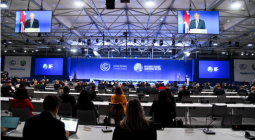What happened at Cop26 – DAY THREE at a glance

Summary of the main developments on the third day of the UN climate summit in Glasgow
Country pledges at Cop26 would limit global temperature rises to below 2C, the first time the world has been on such a trajectory, according to research from the University of Melbourne.
More than 20 countries and financial institutions have vowed to halt all financing for fossil fuel development overseas and divert the estimated $8bn a year to green energy. The signatories include the US, UK, Denmark and some developing countries, including Costa Rica. The European Investment Bank is one of the financial institutions involved.
The staggering take-up of solar power in India has allowed Delhi to make a more ambitious climate plan at Cop26, according to the country’s foreign secretary.
Hundreds of the world’s biggest banks and pension funds, with assets worth $130tn, have committed to a key climate goal. The finance pledge, known as the Glasgow Financial Alliance for Net Zero (GFANZ), will mean that by 2050 all assets managed by the institutions will be aligned with net zero emissions. But experts cast doubt on the significance of the move, pointing out that the banks are still free to pour cash into fossil fuels in the next decade. Rishi Sunak announced that London will become the world’s “first net-zero finance centre”, but environmentalists reacted with scepticism
The heatwaves and wildfires that caused devastation in Europe this summer would not have happened without global heating, new analysis shows. Researchers calculated that for almost all of the past 150 years, the expected frequency of a European summer as hot as 2021 was no higher than once every 10,000 years.
A secretive investor court system poses a real threat to the Paris climate agreement, activists have said, as governments taking action to phase out fossil fuels face a slew of multimillion-dollar lawsuits for lost profits. Data shows a surge in cases under the energy charter treaty (ECT), an obscure international agreement that allows energy corporations to sue governments over policies that could hurt their profits.
3 November 2021
The Guardian




